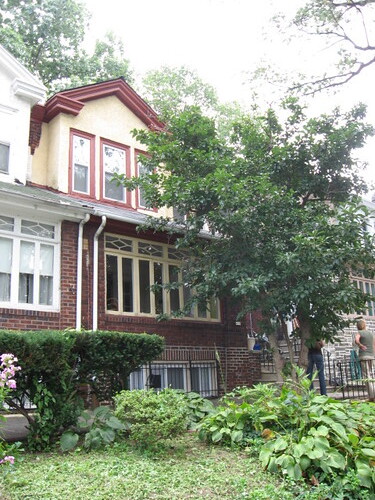I'm working on getting a community garden started in the Francisville section of Philadelphia at the Berean Institute where my church meets. The lot is currently covered with grass and I thought that it would be a good idea to get the soil tested so we can supplement it with whatever urea, peat, or bonemeal it needs.
So I collected samples from the Institute lawn and then figured I'd grab a few bits from my own yard as well. Our back yard has had a tough time growing grass, and the front flower garden has performed adequately, but I'd love to know how to rectify the damage I've done with saltwater runoff from the sidewalk and steps during winter de-icing.
I took them to Primex Garden Center in Glenside which is a fantastic, if a little pricey, nursery. I've gone there with branches of trees before to have them identified, gotten rare perennials from their greenhouses, and had great conversations with the knowledgeable staff. I will always prefer them to the Home Despot for all things green thumbish. Primex can test for pH on site within minutes for free which is a great first step. But I thought a more thorough investigation might be warranted for the community garden plot. Available for $10, they'll provide you with a mail-order kit to send your soil samples to Penn State's Agricultural Analytical Services Labratory. You may mentally connect this to the urban legend of the cow with a window in her stomach. Jessie the cow DID exist with a plastic viewing window into her punctured flank. Alas, despite rumors to the contrary, one cannot go visit Jessie the Ruminant today. She died in 1930. Plus, by even setting foot in State College, PA, today, one immediately becomes too intoxicated to be allowed near farm animals.
Anyways, the process is very straightforward. You need about a cup of soil. They have more complex instructions for taking the soil in plugs from 15 locations, mixing them together, and getting a composite sample from a larger area. But its not like I'm trying to grow award winning rutabagas. I just want to make sure there's not a deadly amount of Francium or something. So, one spade-ful will have to do. However, the instructions do require one to dry out the soil, so that the test covers what's actually in the soil and not the water. (Which seems kind of odd to me, since I would want to know if the water in the soil has Francium, but whatever, what doesn't kill us only makes us glow in the dark.)
So I'm drying soil in paper covered trays in the sunniest windowsills in the house. Admittedly, it looks a little funny, but as long as it finishes drying out before Queen Elizabeth comes over for tea and strumpets, we should be fine.
skip to main |
skip to sidebar


A collection of words and images, all linked, sometimes loosely, to the house in which we live. It's like Martha Stewart Living... but intentionally funny.

About The Blog
Why "The House"?
Because it seemed like a good heading to cover most of the things I like to talk about. The act of just living is so much more important than the 40+ hour a week crap we have to do to get to the good stuff.
Because it seemed like a good heading to cover most of the things I like to talk about. The act of just living is so much more important than the 40+ hour a week crap we have to do to get to the good stuff.
About Us

- The Speaker of the House
- We Live in the Mt. Airy neighborhood of Philadelphia, PA. We married in May '06, bought our first house in September '07. Got a dog in October '08. Continued drinking heavily throughout.
Rooms in the House
- City Living (15)
- Conversations with Our House (3)
- Conversations with Your House (3)
- Greenhouse (26)
- home entertainment (13)
- Home for the Holidays (4)
- Home School (4)
- Homecooking (15)
- House Design (21)
- House of A (1)
- House of K (16)
- House of R (5)
- Housedress (3)
- Housekeeping (12)
- Houseparty (8)
- Housepet (13)
- Houseshopping (38)
- Housework (29)
- The House Red (2)
- The Wise Man Built His House (9)
- White House (10)
Other House Blogs (* Denotes Other Philly Housebloggers)
- DC Rowhouse
- Rowhouse Blog
- Project Rowhouse
- This D*mn House
- Baltimore Rowhouse
- 100 K House*
- Houseblogs
- House Obsession
- Man of the House Blog
- Learning as We Go*
- re:habitat
- 86in It
- Home Improvement Ninja
- Clean Like a Man
- Grassroots Modern
- The Hardware Aisle
- One Project Closer
- Home Construction Improvement
- Straight from the Farm
- House In Progress
- Bake and Shake
- Tool GuyD
Houseguests
Bathroom Reading
Blog Archive
-
▼
2011
(61)
-
▼
March
(18)
- Verge Garden- Part 3: Inspiration
- Invasivore in the City
- Infused Vodka
- Verge Garden- Part 2: Planning
- Planting Strip Garden- Part 1: Introduction
- DJ Self Criticism
- Floating Shelf
- Sanderson Wallpapers- Right in the Kisser
- Kretchma Cocktail
- Throwing the Baby Out
- Getting your Soil Tested
- Open House- 3458 Midvale Ave
- A Good Dry Lay
- Siiiiidecars
- It takes a 1500...
- Uffa!- Long Johns
- You got me Sprung... With Photo Evidence
- Swirlys, Wet Willies, Pink Bellies, Zerberts, Comb...
-
▼
March
(18)



